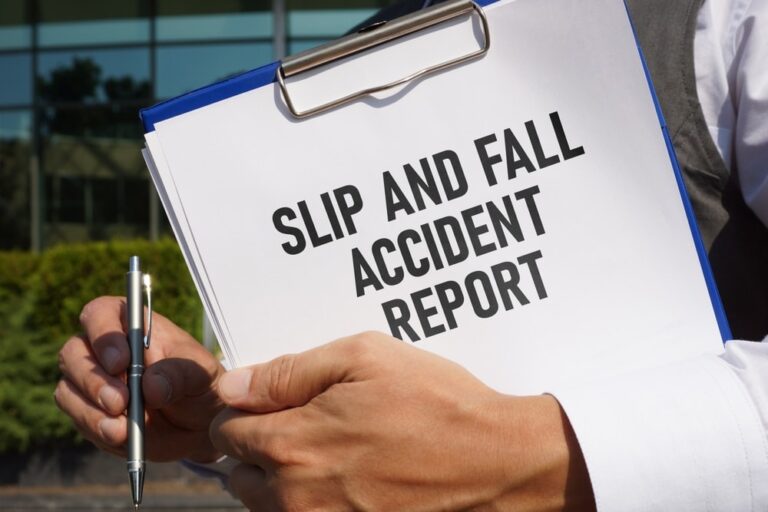Key Takeaways:
- You can sue for a sidewalk fall if negligence caused your injury, depending on city or property owner responsibility.
- Cities may be liable for broken pavement, ice, or construction hazards, but notice and immunity rules apply.
- Private owners must maintain adjacent sidewalks, clearing snow and fixing hazards.
- Comparative negligence in Wisconsin can reduce your compensation if you share fault.
- Strengthen your case by documenting the scene, seeking medical care, notifying the responsible party, and consulting an experienced slip-and-fall attorney.
Accidents on sidewalks are a common source of injuries, especially in areas prone to ice or snow. These injuries can also occur because of poor sidewalk maintenance. But when it comes to legal accountability, determining who is responsible for your injuries can be complex.
So, can you sue for falling on a sidewalk? The short answer is yes—but whether you have a viable case depends on the circumstances of your fall and local laws. Let’s explore this topic in more detail.
Understanding Liability in Sidewalk Slip-and-Falls
To sue for a sidewalk fall, you must prove that someone’s negligence caused your injury. Negligence means failing to take reasonable care to prevent harm to others. With sidewalks, responsibility often falls on one of two parties:
- Municipalities: Local governments are typically responsible for maintaining public sidewalks.
- Private Property Owners: In some areas, adjacent property owners are responsible for clearing hazards like snow and ice.
Who is liable varies by location, and understanding the local rules is essential for building a strong case.
When You Can Sue a City or Municipality for a Sidewalk Fall
If you fall on a public sidewalk, the city or municipality may be liable if they failed to properly maintain the sidewalk. This could include:
- Broken or uneven pavement: Cracks, potholes, or sudden height differences.
- Dangerous conditions caused by snow or ice: If the city failed to clear a hazardous accumulation of ice or snow within a reasonable timeframe.
- Construction hazards: Sidewalks left unsafe during or after road or utility work.
However, suing a municipality comes with additional legal hurdles:
Notice Requirements
Most states require you to notify the city of your injury within a specific timeframe. In Wisconsin, for instance, you must provide written notice of your intent to file a claim within 120 days of the accident. Missing this deadline could jeopardize your case.
Governmental Immunity
Municipalities often have immunity from certain lawsuits. That said, this protection does not shield them if they were aware of the danger. It also does not shield them if they should have known about the danger or neglected to fix matters within an acceptable timeframe. For example, a city might be liable if they ignored reports of a broken sidewalk for months.
When Private Property Owners Are Liable
In some jurisdictions, private property owners are responsible for maintaining the sidewalks adjacent to their property. This typically includes:
- Clearing snow and ice: Many cities, including Wisconsin cities, have ordinances requiring property owners to clear sidewalks within a timeframe after snowfall.
- Fixing structural hazards: Uneven pavement or cracks caused by tree roots or other factors may fall under the property owner’s responsibility.
If a property owner fails to meet these obligations, they can be held liable for injuries.
What Factors Affect Your Case?
Several factors can influence whether you can successfully sue after a sidewalk fall:
- Severity of the Hazard: Minor imperfections or small patches of ice may not be enough to prove negligence. Courts typically require the hazard to be significant and unreasonable.
- How Long the Hazard Existed: A property owner or city is not expected to address a hazard instantly. For example, they may not be liable if ice formed overnight and your fall occurred early in the morning.
- Your Own Actions: In Wisconsin, which follows comparative negligence laws, you could see a reduction in compensation based on your fault level. For instance, if you were texting while walking or wearing improper footwear, the court might determine you share some responsibility.
Steps to Take After a Sidewalk Fall
If you’ve been injured in a sidewalk fall, taking the right steps can strengthen your case:
Document the Scene
Take photos of the sidewalk, focusing on the hazardous condition that caused your fall. This evidence can be critical in proving negligence.
Seek Medical Attention
Even if your injuries seem minor, seeing a doctor ensures your injuries are documented. This is vital for any legal claim.
Identify Responsibility
Determine whether the sidewalk is maintained by the city or a private property owner.
Notify the Responsible Party
If a municipality is involved, provide written notice of your claim as required by local laws.
Consult an Attorney
Slip-and-fall cases can be legally complex. An experienced attorney can help determine liability, gather evidence, and navigate any legal deadlines or restrictions.
Challenges in Proving Fault
Suing for a sidewalk fall isn’t always straightforward. The responsible party may argue that the hazard was minor, unavoidable, or that you contributed to the fall. This is where evidence like photographs, medical records, and witness testimony becomes essential.
Seek Legal Counsel
Injuries from sidewalk falls can have serious consequences, from medical bills to lost wages and long-term pain. It’s certainly possible to sue for falling on a sidewalk. However, success depends on proving negligence, meeting legal requirements, and overcoming defenses like comparative fault.
If you’ve been injured in a sidewalk fall, don’t assume you’re without recourse. Contacting a slip and fall attorney can help you understand your rights, identify the liable party, and pursue the compensation you deserve.
Need help with a sidewalk injury claim in Wisconsin? Contact Pemberton Personal Injury Law Firm today for a free case evaluation.
 Calls Answered 24/7
Calls Answered 24/7



